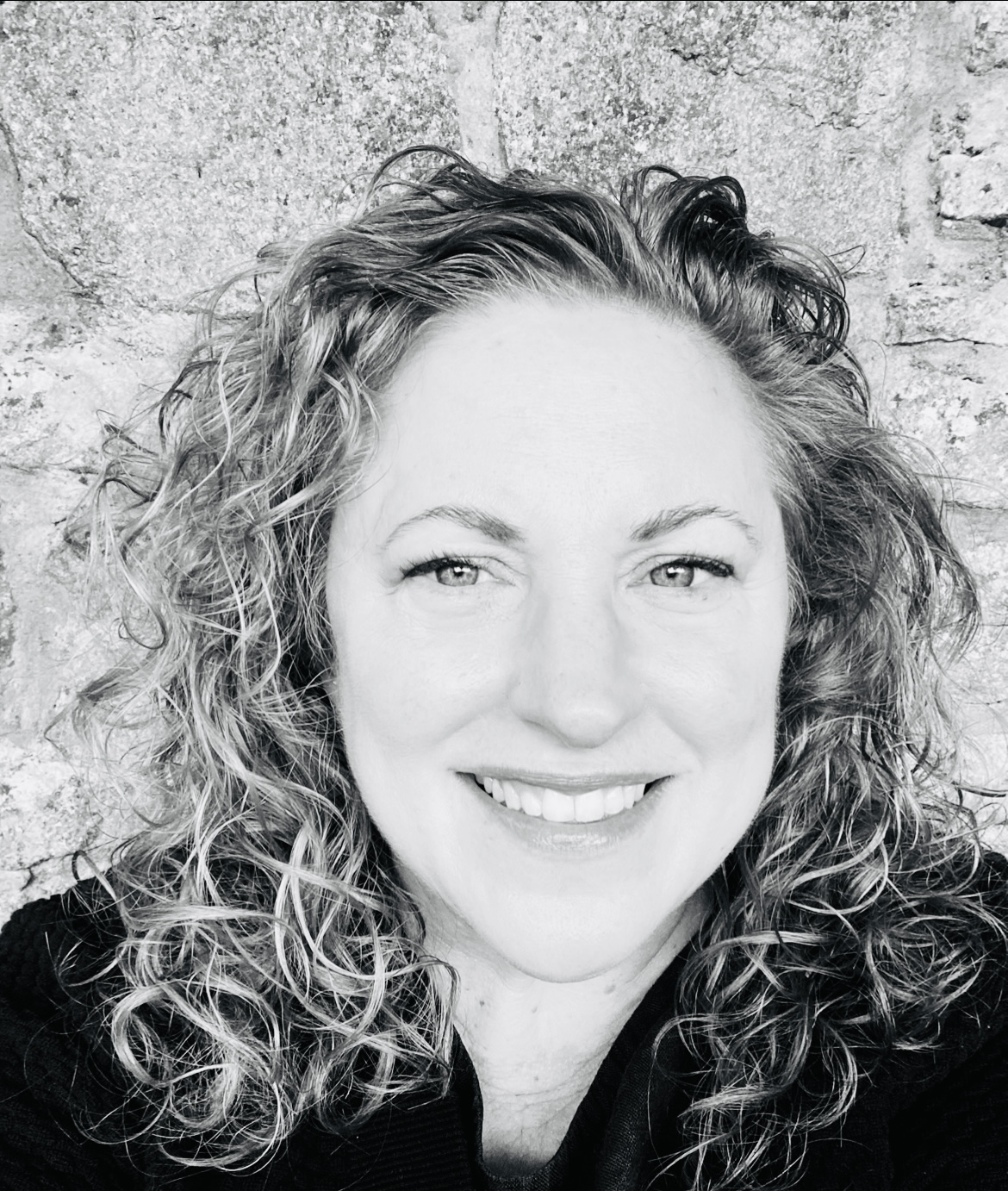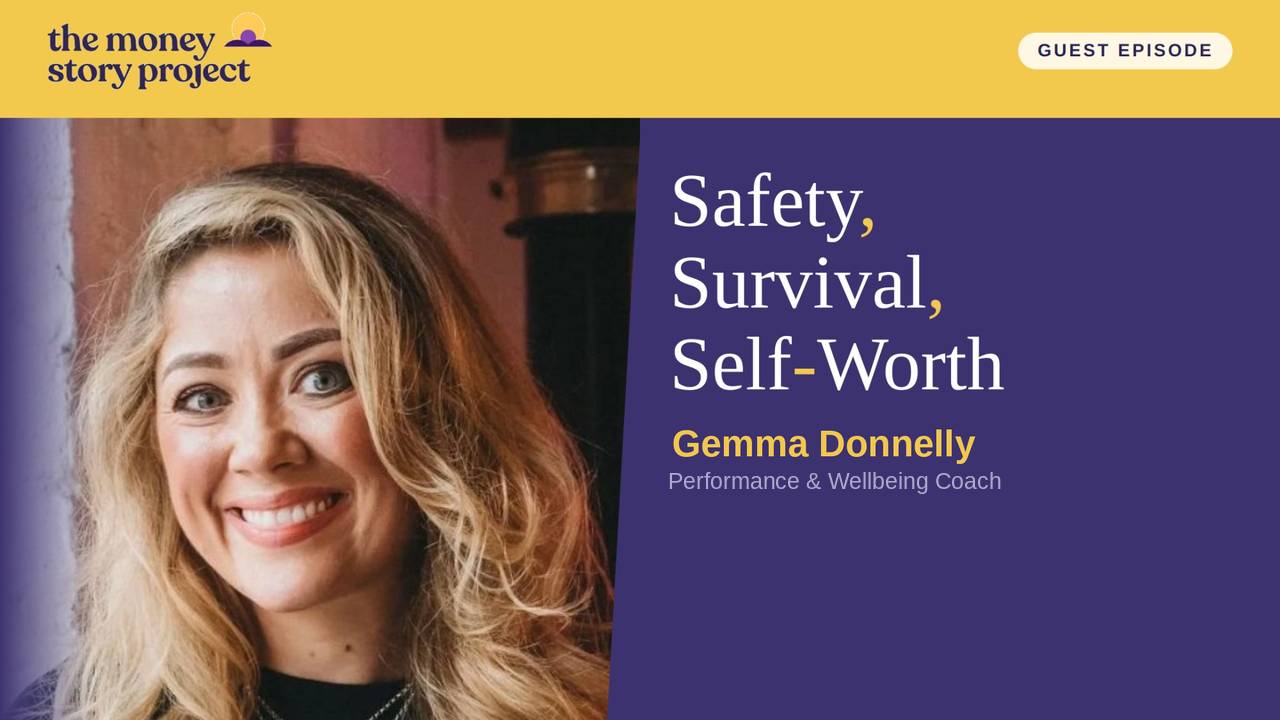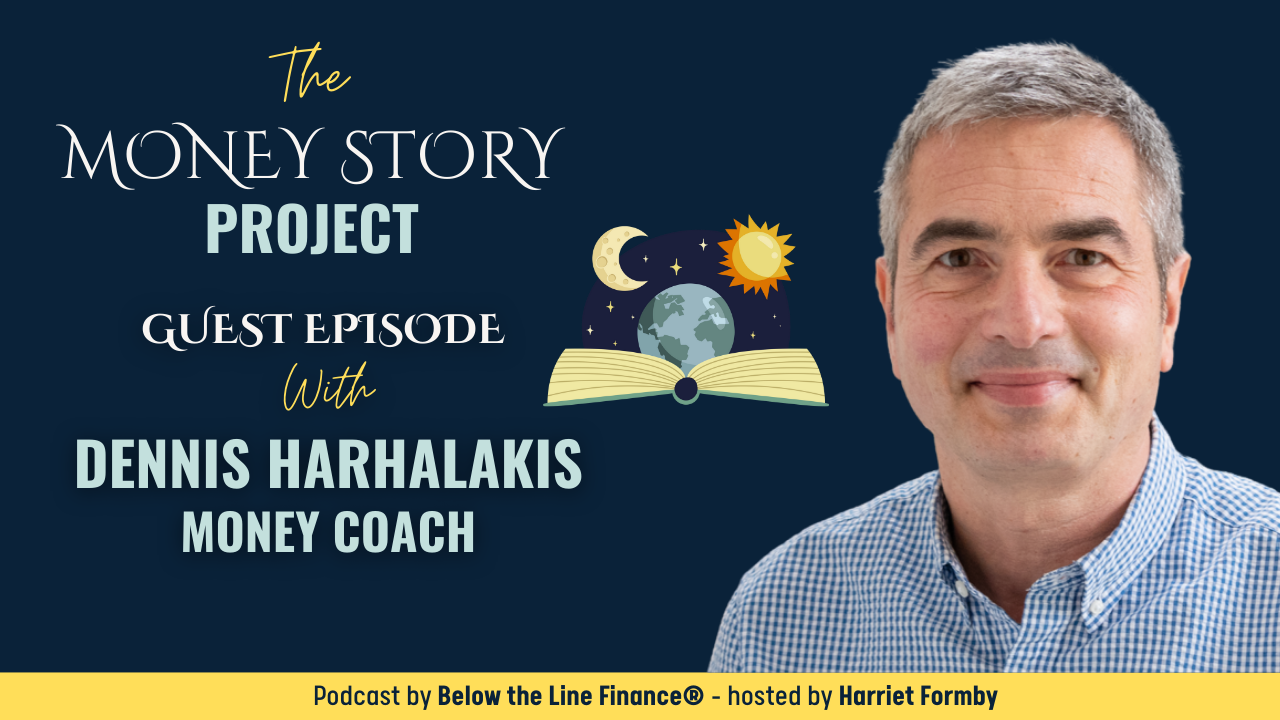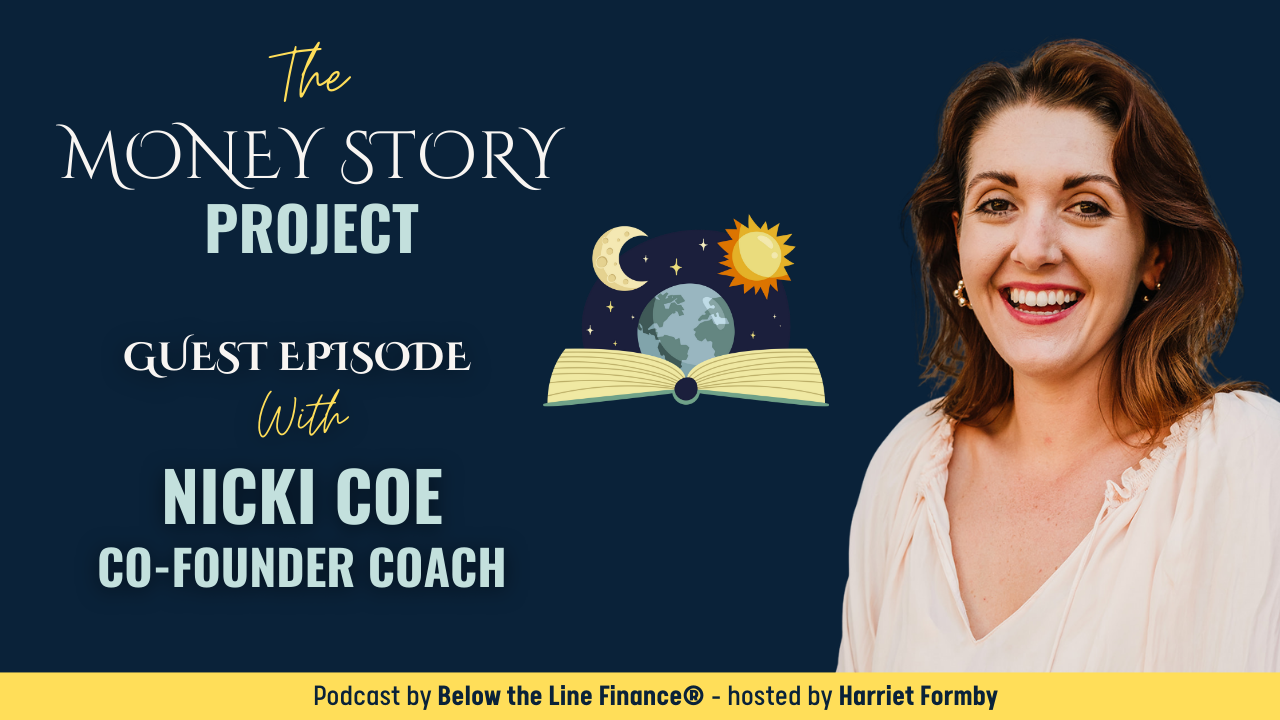Creativity, Resilience & Honouring Energy — with Kirsty Anna Sinclair

Themes: Rural poverty and creative abundance · building from nothing with machetes and borrowed money · luxury as conspiracy · the wellness centre that disappeared overnight · single motherhood and benefits stigma · burnout, vulnerability, and starting again · "bad at maths" as money block · overnight success myths and hidden privileges · astrology as business sustainability tool · bringing money out of the shadows
From building a house from scratch in rural Australia to creating Sky Insider — a private podcast redefining how female founders plan their days — business astrologer Kirsty Anna Sinclair maps a money story shaped by pioneering parents, sudden loss, and the intentional work of making peace with numbers and embracing creativity.
Money in the Light
When I ask Kirsty Anna Sinclair what comes up when she hears the word money today, there's no hesitation — just possibility.
"I feel like we're on the precipice of a whole brand new story, particularly around females and money. Not just money specifically, but the wider sense of resourcing — making tiny bits stretch, which has always been our speciality in the caretaking context."
She pauses, then continues:
"Money has brand new ways for us to work with it. But for that to start happening, we have to start thinking about it differently, talking about it differently, and releasing ourselves from the emotions around it — seeing them and holding them up without shame or that weird secrecy."
This openness wasn't always there. Kirsty's money story begins with borrowed money, pioneering parents, and a childhood spent in rural poverty watching abundance created from almost nothing.
Pioneers, Poverty, and Creative Wealth
Kirsty was born in the UK but grew up in Australia, in a family she describes as "a long line of pioneers and creative people."
"When my parents returned to Australia with two daughters, they didn't buy a house — they bought land. My dad went at it with a machete and a chainsaw. They drilled for water, and once they had water, they knew it was okay to buy it."
They lived in a big shed for two years while her dad built the house himself. The family used "a lot of debt, a lot of borrowing, and a lot of fears about money" to propel them into creating resources from what they had.
"We had periods of living in quite severe rural poverty — without running water, without electricity, without sanitation. I really do know what it's like to have or to feel as if you have nothing."
But there was another side to the story.
"In many other ways, we were very rich. My parents valued culture. We were taken to theatre performances, involved in creative things — all done on an incredibly minimal budget. Both my parents were involved in local amateur dramatics. My mum did makeup and hair design, my dad built stage sets."
The lesson that stuck: "What I associated creativity with was a tool where money was absent. If you don't have one thing, you might have a bit of the other."
The Conspiracy of Luxury
Because all available money went into essentials — building the house, connecting electricity, installing underground water — anything beyond survival became quietly shameful.
"My mum would squash her needs or her desires. There's this tendency to do things on the quiet and not really talk about how much money we might spend on ourselves."
The memories are specific: her dad complaining about the cost of her mum's haircuts. Her mum cutting Kirsty's hair at home with "the classic 70s fringe that went like that", a pair of shoes for school, a pair of flipflops.
"I remember my mum trying to get dressed in secret. After a while, I noticed she had safety pins in the back of her bras where they were starting to fall apart. She didn't work — she was a homemaker, and my dad was the main breadwinner."
Her mum would take Kirsty shopping and sneak into the perfume shop for a quick spray of Miss Dior— a moment of sensory luxury grabbed quietly, guiltily.
"There was almost a sense of conspiracy around things that were expensive or had a sense of luxury."
Years later, when Kirsty became a parent herself, she found herself repeating the pattern.
"I found myself doing the same thing — almost a sense of shame or guilt around spending money on something non-essential but that I loved or that made me feel good. It's been a long time working on that — this idea that I must sacrifice my own desires because somebody else will always need this more than I do."
This tension between creativity and money, between making do and making space for desire, would weave through Kirsty's entire career. Her postgraduate training in careers guidance taught her interview techniques to help people access an expansive, creative state when thinking about their futures — skills that would later inform how she developed Sky Insider's supportive framework.

Kirsty Anna Sinclair - The UK Business Astrologer for Female Founders
The Wellness Centre: Built and Lost
After training as a teacher in Australia, Kirsty had relocated to England to the West Country and had been supply teaching. Then came a phone call that changed everything.
"The local authority said, 'I'm afraid we can't employ you. You were trained abroad, which means you don't actually have qualified teacher status here.' I had a mortgage. I was very worried about what I was going to do."
She got part-time work and retrained as an aromatherapist. Her partner at the time had a building with commercial planning permission.
"I had this brainwave at the end of my course: why don't I open my own version of Neal's Yard? The idea just took off."
"Before she started, Kirsty did her research. She visited wellness centres in surrounding counties and had treatments. Then she went to the Neal's Yard branch in Clifton.
'I got chatting to the receptionist. They were so nice. I said, "Do you know what? I'm going to start a place like this one. But don't worry, it's miles away. It won't be a competitor." And I asked, "If I wanted to rent a room here, what's the process?" She was so nice. She was completely open. She told me everything about what they charge, what the conditions were. She gave me a copy of the standard contract they used to give to their practitioners.'
Having that template, that proof of concept from people who'd done it before, made all the difference."
She ran the wellness centre for two or three years, working the front desk six days a week, subletting treatment rooms to around twelve practitioners.
"I loved it. I spent a long time listening to people, becoming awestruck at the different human differences. There is no one way to make ourselves feel better."
Then she unexpectedly fell pregnant. It wasn't planned. She’d split with her partner. She was living in a friend's box room when she realised what was happening.
"I thought, right about face. This is a complete split from what I thought I was going to do to what I am going to be doing now."
She had to close the wellness centre. Her income: gone. Her career: gone.
"Very suddenly my life went from running a business, being hugely successful, loving what I did, to living on benefits."
The Estate Agent Lie
Finding housing as a pregnant woman on benefits proved impossible.
"I walked into three estate agents and said, 'I'm pregnant, I need a two-bedroom place, I'm going to be in receipt of housing benefit.' They all said, 'Well, we can't help you.'"
She was astounded. So she adapted.
"I put a very big jumper on and went into an independent estate agent. I lied. I said, 'I need to rent a two-bedroom house because I run a business' — which was still running at the time — 'and I need an extra room as an office.' They were delighted to help me."
That's how she found a home. That's also when she learned what it felt like to be "a single mum on benefits" — words she says are spoken as if they're one word, loaded with judgment.
"There was a long battle over finances in those early years of my daughter's life, which sometimes overshadowed the joy that new parenthood brought. I had to shut out so much noise about women and money, about the stigma around receiving money you haven't done something to earn."
She looks back now with compassion.
"I didn't have time to be sad that I had to close my wellbeing centre overnight. I didn't have time to celebrate the things that went right. I didn't have time to process how difficult it had been being under-resourced."
The rhetoric about people receiving financial support still stings.
"Even now, around half of working people are in receipt of some kind of financial support from the government. But the narrative is still so harsh about people receiving support they 'haven't done something to earn' — as if raising a child isn't work."
Starting Again: Fear and Isolation
Years later, Kirsty found her way back into teaching. Then she left teaching and she started building the business she runs now — and all those buried emotions surfaced.
"I was afraid to start. I thought, what if this just goes again? What if something happens to me? There's that sense of vulnerability as an entrepreneur — if you are the business and something happens in your life, then what?"
She realised she couldn't just be an astrologer. She had to carve out "a way of working that was sustainable for my health and for all the other things I had to do with my life."
There was also isolation.
"When I'd been running the wellbeing centre, I had people around all the time — incredibly validating. This time, I was sitting at my kitchen table with a laptop and an idea. Who am I to be doing this? Who's going to want to be part of this?"
Even though she'd run a successful business before, "it didn't feel like it helped."
The context was too different. The identity had shifted. The template was gone.
'Bad' at Maths, 'Bad' at Money
One of Kirsty's biggest blocks was around numbers — all numbers, not just money.
"I was terrible at maths at school. That was not a good start. I thought, I'm bad with numbers. And when I started to unravel my money story, believing I was bad with numbers was one of my core unconscious beliefs."
Money is numbers. Business is numbers — not just revenue and expenses, but engagement rates, follower counts, conversion percentages, time.
"If you believe you're bad at maths, somewhere in there you could also be thinking, Money is part of that. I don't deserve to manage money. I'm going to make a mess of this. And that affects everything in running a business — pricing, everything."
She joined a money group. She started unpicking the belief. She also started learning about the hidden numbers of business — the ones nobody talks about in the success stories.
"People who are great at sales say you have to keep selling through the silence. Out of 1,000 people who might see your stuff, only 20 might stop and read it. Out of those, one might think, Yeah, that's sort of interesting, and then ignore it."
Hearing about real sales journeys, real engagement numbers, real timelines changed everything.
"Just how long people have had to wait before they've had any response at all — that's numbers, because it's time."
She learned to look at her data without emotion, using her logical mind to understand what it was telling her — which posts performed well, when her followers were online, how to be more intentional with her time and energy.
"I decided I needed to make friends with it. You have to be brave sometimes."
"She started paying attention to patterns. On LinkedIn, her Thursday posts almost always outperformed the others. Instead of 'spraying and praying' — posting whenever and hoping for the best — she became strategic about when and how she showed up.
She also started questioning received wisdom about business cycles. Everyone said summer would be quiet, that nobody buys in Quarter 4 except for Christmas. But when she experimented, she found exceptions.
'I've heard from other entrepreneurs who said, "I was hardly online between Christmas and New Year, and actually I sold five of my offers that were sitting there." People are scrolling at Christmas time, thinking about what they want for the new year.'"
Overnight Success and Hidden Privilege
One of the themes Kirsty returns to repeatedly in her work with female founders is the myth of overnight success — and the privilege that often sits behind it.
"Women feel bad about the amount of time it's taking for their businesses to grow. It's hard to counteract the stories about overnight success we see on repeat in everybody's Meta ads."
She's blunt about what those stories leave out.
"Either it's a big lie, or the person has been in a position of privilege that some of the rest of us don't have — which means our route to wealth might be more circuitous."
That privilege might be connections, an existing audience, another adult in the house, or another source of income that keeps life "nice and cruisy" while they build.
"Developing a business becomes almost optional, like a hobby. We don't always know what privilege somebody else has who maybe pulled off the massive win overnight."
She's not begrudging anyone their resources. She's just naming what's missing from the narrative.
"We all use whatever resources we have. But we're not always honest about it when we're selling to others."
Sky Insider: A Framework for Sustainability
After experiencing burnout in teaching, Kirsty knew she needed to approach business differently.
"I tried lots of conventional approaches to getting more done every day — the business equivalent of 'do your stretches while you clean your teeth.' I was going quietly mad trying to do more and more with fewer and fewer personal resources."
At one point, she bought a business roadmap from a woman who was very well thought of in the business world. But the strategies didn't work for her.
'Her suggested strategies were very much rooted in that very masculine, always-on approach to business. With all the other things I do and the other jobs I have to do in my life, I just couldn't work like that. Some days I was fine, and then other days I just thought, I can't face this. I can't do it.'
She started withdrawing from the weekly Zooms — the online party atmosphere, the 'Come on everybody, put in the chat, tell me three things you've done this week.'
'I couldn't work like this, but I was so ambitious for this idea, and it was keeping me awake at night. I really wanted to do this. I had to find a way to make it work.'"
She turned to astrology — specifically, psychological astrology based on Carl Jung's work.
"The business world has been trying since the Industrial Revolution to treat us all as standard units, rather than incredibly different and diverse and amazing individual people with individual needs."
She started shadowing the personal planets closely over six months, noticing patterns.
"Astrology always has an explanation for why some days we're really on it and other days there's suddenly an energy drop-off. Rather than using astrology to explain how we felt last week, why aren't we using it as a future planning tool?"
That's how Sky Insider was born — a private podcast delivered daily to female founders' inboxes.
"I wanted something really agile that could fit into someone's life easily. Every morning, you get about 10 minutes where you can just listen while drinking your tea. Someone's giving you that map ahead of time: here's the focus for today, here's when your energy might drop off, here's what to prioritise."
It's designed to prevent the overwhelm and firefighting that so many business owners experience.
"Those peak points of flare-ups — oh my God, my tax, I haven't touched it for months — astrology organises it for you. You've got touch points every week so you don't fall behind. You finish each week with that sense of self-congratulation: I've got to the end of another one, I'm holding all those balloon strings, and it's not eating up my life."
It's also designed to protect the thing Kirsty values most: creativity.
"Creativity as a practice is great for your brain health — doing something where there are all sorts of possibilities in front of you for unlocking parts of your mind that have become stuck. We need to see the value of creativity and money together, not as mutually exclusive."
She draws on the work of economist and advisor Pippa Malmgren, whose book Signals explores how to make economic predictions by watching creative people. Creative people, Malmgren argues, are far ahead of the rest of us in terms of possibilities and creative thought. When you feel stuck, look at something creative that someone else has made — it will help unstick you.
If Money Were a Person
I ask Kirsty what she'd say to money if it were a person sitting across from her.
"Money, you don't belong in the shadows. You've had this mercurial energy that humans have made you into — this topic that dwells in the shadows, this substance that some have and some don't.
"Come out of the darkness and be this amazing tool for positive change that we can hold in our hands with a light touch. Just say, here it comes, and there it goes. As it moves around, the more it moves in the light, the more capacity it has for positive change.
"But for all the time it's lurking in the shadows and it's this weird thing, it becomes a big thing in our subconscious. Bring it out."
Moving Forward
Kirsty isn't claiming to have it all figured out. The shame around self-spending, the fear of vulnerability, the residual "bad at maths" belief — they're still in the room.
What's different is the practice: bringing money into the light, questioning the narratives, making friends with numbers, building sustainability into the business model rather than trying to force herself into someone else's template.
And speaking it out loud. Because when one person names the quiet thing — the benefit stigma, the wellness centre grief, the overnight success lies — the rest of us hear the echo and can start loosening our own grip.
About Kirsty Anna Sinclair
Kirsty Anna Sinclair is a UK business astrologer, writer, and broadcaster who guides female founders as they navigate the balance between busy lives and disruptive ambition. She's the creator of Sky Insider, an innovative private podcast redefining how female founders approach their business day.
Before this, Kirsty built a rich and varied career: she founded a wellness centre, had a career in education, and has openly shared her own story of burnout — experiences that deeply inform the work she does today.
- Website: kirstyannasinclair.com
- Sky Insider: Sign up via her website for daily astrological guidance delivered to your inbox
- Instagram: @sky_insider
- LinkedIn: Kirsty Anna Sinclair
This conversation is part of The Money Story Project — a storytelling space where we explore what money means, what it's meant, and how we're all learning to carry it differently. If Kirsty's story resonated, consider sharing it with someone who might need to hear it too. Connect with host, Harriet Formby.
Podcast Spotify Apple Podcasts








